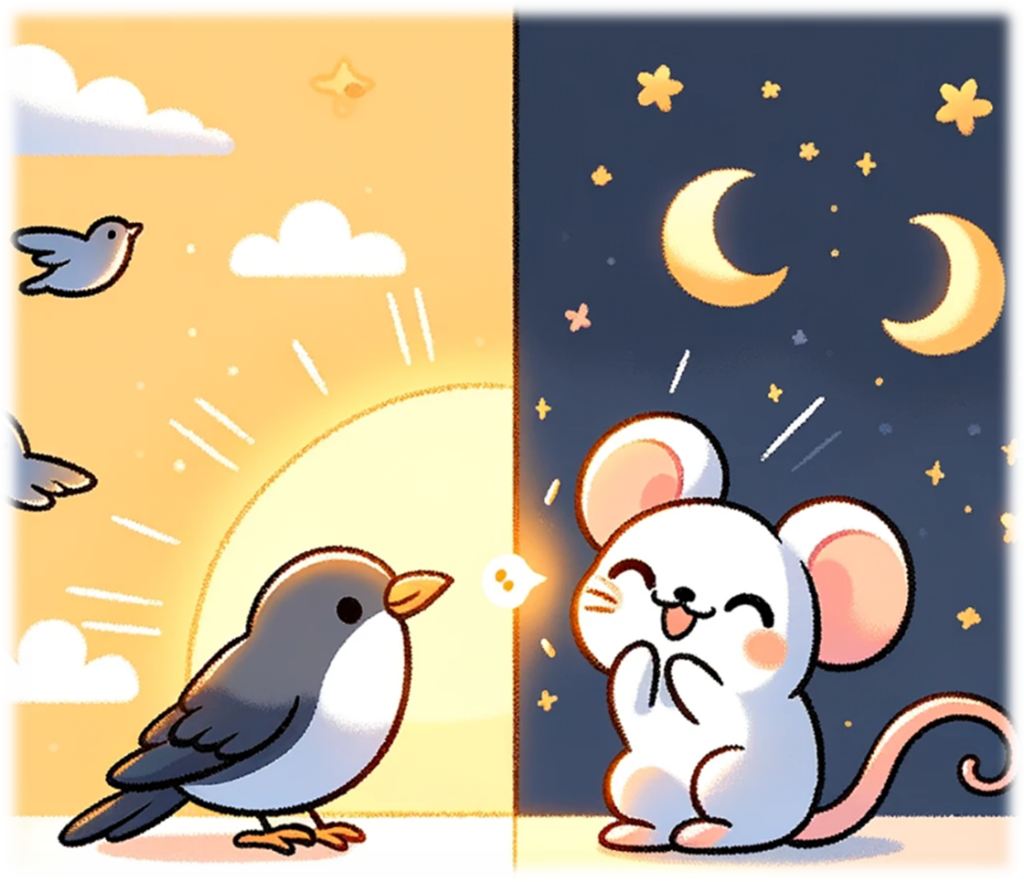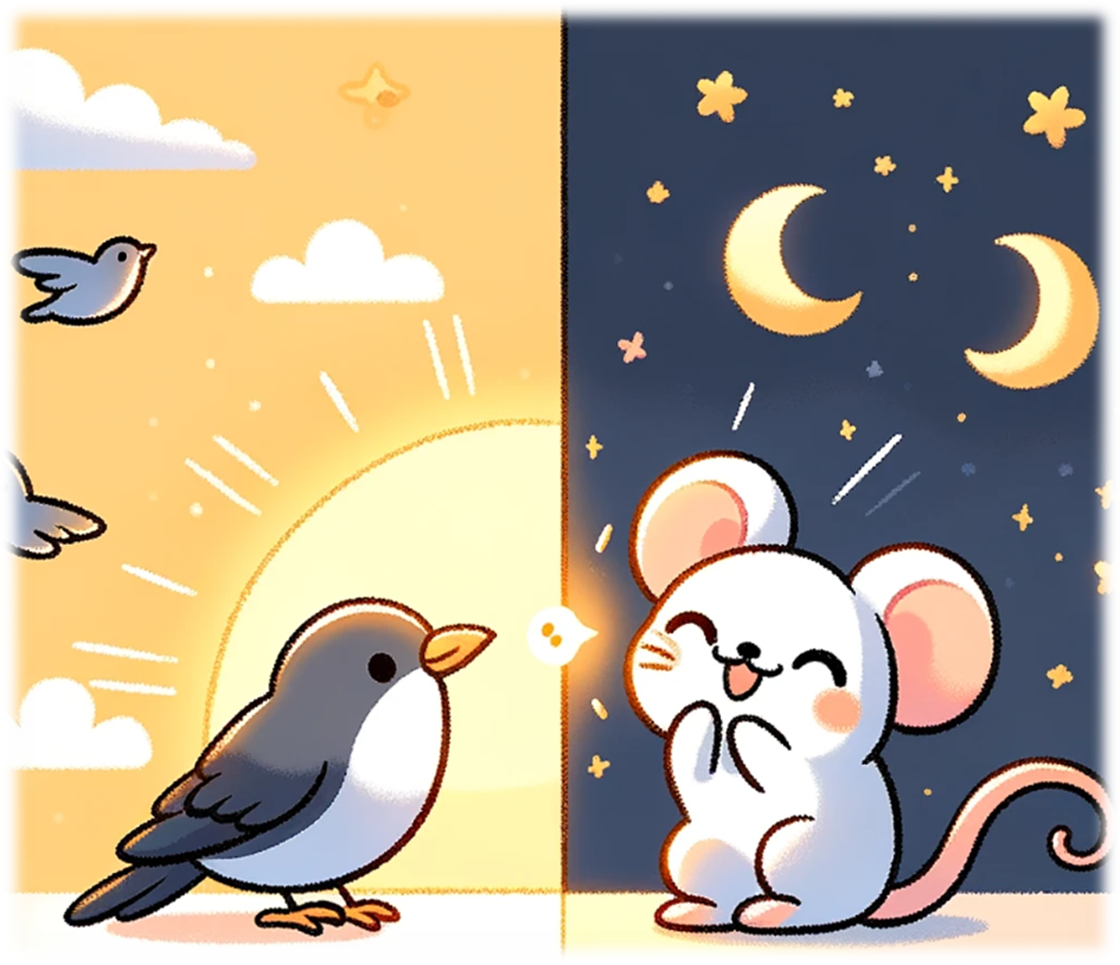Contents
- ▶ 속담의 설명 (Proverb Explanation)
- ▶ 속담 마무리(Conclusion)
” 낮 말은 새가 듣고 밤 말은 쥐가 듣는다고 내가 모를 줄 알았어? “
” You didn’t think I’d know that ‘ 낮 말은 새가 듣고 밤 말을 쥐가 듣는다. ‘ “

▶ 속담의 설명 (Proverb Explanation)
1. 속담 직역 (Proverb Literal translation) ▷▶ The birds hear the words spoken in the day, and the mice hear the words spoken at night.
2. 속담 의미 요약 (Proverb Summary)
• This means that you should always be careful about what you say, as there is always someone listening.
3. 유사 속담 (Similar Proverb)
• The walls have ears.
4. 속담 상세 정보 (Detail Information of Proverb)
“낮 말은 새가 듣고 밤 말은 쥐가 듣는다”라는 속담은 언제 어디서나 말을 조심해야 한다는 의미를 담고 있습니다.
낮에는 새가, 밤에는 쥐가 듣는다는 말은 항상 누군가가 우리의 대화를 듣고 있을 수 있다는 것을 상징적으로 표현합니다.
이 속담은 사람들에게 말을 함부로 하지 말고, 항상 신중하게 행동해야 한다는 교훈을 주려는 의도를 가지고 있습니다.
또한, 이 속담은 부정적인 이야기나 비밀을 말할 때 특히 주의해야 한다는 경고의 메시지를 전달합니다.
The Korean proverb “낮 말은 새가 듣고 밤 말은 쥐가 듣는다,” which translates to “The birds hear the words spoken in the day, and the mice hear the words spoken at night,” implies that one should always be careful about what they say, as someone might always be listening.
The idea that birds listen during the day and mice at night symbolizes the possibility of being overheard at any time.
This proverb serves as a reminder to speak cautiously and act prudently, especially when discussing negative matters or secrets.
It conveys a warning to be mindful of one’s words, emphasizing that private conversations can easily become public knowledge.
속담 예시(proverb example) 1)
- 상황: 회사에서 두 동료가 다른 동료에 대해 험담을 하고 있었습니다. 그들은 그 동료가 그들의 대화를 듣고 있지 않다고 생각했습니다.
- Situation: In the office, two colleagues were gossiping about another colleague, thinking that he wasn’t listening to their conversation.
- 사용: 그 후, 그들의 상사가 그들을 불러 “낮 말은 새가 듣고 밤 말은 쥐가 듣는다고 했어. 조심해야 해, 너희가 하는 말이 다른 사람 귀에 들어갈 수 있어”라고 경고했습니다.
- Usage: Later, their supervisor called them in and warned, “Remember, the birds hear the words spoken in the day, and the mice hear the words spoken at night. Be careful, your words might reach others’ ears.”
속담 예시(proverb example) 2)
- 상황: 학교에서 학생들이 교사에 대한 비판적인 의견을 나누고 있었는데, 그 교사가 갑자기 그들 옆을 지나갔습니다.
- Situation: At school, students were sharing critical opinions about a teacher, and suddenly that teacher walked past them.
- 사용: 한 학생이 다른 학생에게 “우리 말 조심해야 해. 낮 말은 새가 듣고 밤 말은 쥐가 듣는다니까”라고 말했습니다.
- Usage: One student said to another, “We should be careful with our words. The birds hear the words spoken in the day, and the mice hear the words spoken at night.”
5. 속담 속 오늘의 단어(Vocabulary in Proverb)
| 오늘의 단어 | |
| 낮 | day |
| 말 | word |
| 밤 | night |
| 쥐 | mouse |
| 새 | bird |
| 듣다 | hear, listen |
| 대화 | conversation |
| 비판적인 | critical |
| 조심하다 | be careful |
▶ 속담 마무리(Conclusion)
As we reflect on the Korean proverb “The birds hear the words spoken in the day, and the mice hear the words spoken at night,” let’s remind ourselves of the importance of being cautious with our words.
This saying encourages us to be mindful that our conversations can be overheard and may have unintended consequences.
May this proverb inspire you to communicate with thoughtfulness and integrity.
Understanding that our words can carry further than we intend, let’s strive to speak with kindness and respect at all times.
Looking forward to sharing more cultural insights with you.
Speak wisely, and let your words reflect the best of you!
‘낮말은 새가 듣고 밤말은 쥐가 듣는다’라는 속담을 통해 우리는 말을 조심해야 하는 중요성을 다시금 생각해 봅니다.
이 속담은 우리의 대화가 들릴 수 있으며 의도치 않은 결과를 낳을 수 있음을 상기시켜 줍니다.
이 속담이 여러분이 생각을 담아 말하고 정직하게 소통하도록 영감을 주기를 바랍니다.
우리의 말이 의도한 것보다 멀리 퍼질 수 있음을 이해하고, 언제나 친절과 존중을 담아 말하는 것을 목표로 합시다.
더 많은 문화적 통찰을 나누기를 기대합니다.
현명하게 말하고, 여러분의 말이 최선의 모습을 반영하도록 하세요!
신뢰를 주는 이들을 현명하게 선택하고, 신뢰가 마땅히 자리 잡아야 할 곳에 두세요!
녹음 된 소리를 들으면서 공부하기 (추후 제공 예정)
이 곳은 향후에 해당 속담 포스팅의 한글을 원어민이 읽어주는 녹음본이 게시될 예정입니다. 여러분들의 한국어 공부에 도움이 되고자 노력 중이니 잠시만 기다려주세요. 감사합니다. This space will soon feature a recording of the post being read by a native speaker in Korean. We are working hard to assist with your Korean studies, so please stay tuned. Thank you. 이 곳은 향후에 해당 속담 포스팅의 한글을 원어민이 읽어주는 녹음본이 게시될 예정입니다. 여러분들의 한국어 공부에 도움이 되고자 노력 중이니 잠시만 기다려주세요. 감사합니다. This space will soon feature a recording of the post being read by a native speaker in Korean. We are working hard to assist with your Korean studies, so please stay tuned. Thank you.
다른 속담 링크
